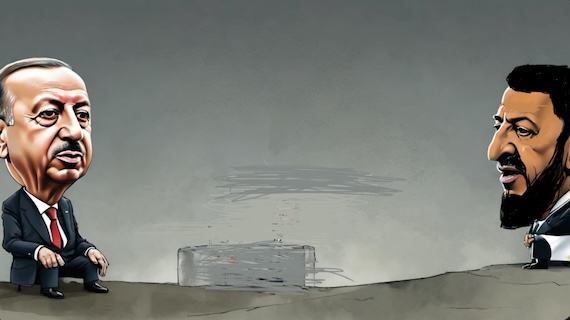Istanbul (Special to Informed Comment; Feature) – Last week, Syria’s newly appointed President Ahmed al-Sharaa visited Ankara to meet with Turkish President Recep Tayyip Erdoğan, marking the highest-level meeting between Türkiye and Syria since 2009.
The visit was al-Sharaa’s second international trip since being declared president, following his recent visit to Saudi Arabia.
During the meeting, key issues such as Syria’s reconstruction, economic cooperation, and the return of Syrian refugees were at the forefront. In addition, both leaders emphasized the importance of a joint stance against the outlawed Kurdistan Workers’ Party (PKK) and Islamic State (IS), as well as the training of a new army in Syria.
“We were pleased to see that we are in complete agreement on almost every issue,” Erdoğan said.
al-Sharaa’s visit provoked various reactions in Türkiye. While Turkish pro-government media hailed the meeting as a historic step toward normalizing and strengthening bilateral relations, pro-secular opposition media and Alevi federations condemned the visit, some even referring to al-Sharaa as a “killer” and “terrorist.”
Defence Cooperation
Prior to the visit, Reuters reported that al-Sharaa and Erdoğan were expected to discuss a joint defense pact. According to Reuters’ anonymous sources, including a Syrian security official, two Damascus-based foreign security sources, and a senior regional intelligence officer, the pact may include Türkiye establishing two new air bases in Syria’s central desert region, also known as “Badiyah.”
The potential locations identified for these bases were the Palmyra military airport and the Syrian army’s T4 base in the province of Homs.
The day after the visit, Turkish Foreign Minister Hakan Fidan announced plans for a four-country anti-IS coalition comprising Türkiye, Iraq, Syria, and Jordan.
In addition to defense arrangements, the talks also addressed the restructuring of the Syrian Army. On January 29, during the Syrian Revolution Victory Conference, the transitional government announced the dissolution of Syria’s Assad-era parliament, the former regime’s army, its security agencies, and the Ba’ath Party.
Furthermore, several former rebel factions, including al-Sharaa’s Hay’at Tahrir al-Sham (HTS), were disbanded and integrated into the Syrian Ministry of Defense.
According to YetkinReport, sources from Türkiye’s Defense Ministry have confirmed their intent to assist Syria in restructuring its military through a three-phase approach: reviving the functionality of state institutions, addressing Syria’s defense challenges, and outlining Türkiye’s proposals for post-war recovery.
Despite these discussions, the Turkish Defense Ministry stressed that it is “too soon to talk” about potential Turkish military bases in Syria. “It is necessary to approach such news in the media with caution and carefully read and understand its content. It is too early to discuss such topics at this moment,” the ministry said.
“Turkey/ Syria,” Digital, Dream / Dreamland v3, IbisPaint, 2025
Syria’s Economic Recovery
Economic cooperation remains a cornerstone of the emerging relationship between Türkiye and Syria, and an economic recovery in Syria is crucial for the region.
Ankara regards Syria’s reconstruction as a major economic opportunity. Turkish companies in construction, energy, and agriculture are expected to benefit from the rebuilding efforts, while Türkiye’s hosting of over 3.5 million Syrian refugees means that a stabilized Syria could encourage voluntary returns.
However, both Türkiye and Syria face significant economic challenges and cannot independently finance such an extensive reconstruction effort. Syria needs foreign funding, the opportunity to generate revenue from its natural resources, and a reopening to the global market, which is a process that hinges on the lifting of international sanctions.
This is why Ankara urges the removal of sanctions on Syria. Türkiye’s permanent representative to the UN told the Security Council that the international community must adopt a constructive approach and facilitate a smooth transition in Syria.
Meanwhile, Türkiye has already begun to deepen its economic ties with Syria.
On January 23, Turkish Airlines resumed Istanbul-Damascus flights after a 13-year hiatus; on February 5, Syria signed a new deal with France-based CMA CGM (with a 24% stake owned by Turkish Yıldırım Holding) to operate the container terminal at Latakia Port; and on February 11, Türkiye removed export, import, and transit restrictions on Syria, including lifting limitations on goods passing through the Turkish Customs Zone.
Syria’s new regime is also actively seeking to normalize its foreign relations with other nations besides Türkiye.
On January 30, Qatari Emir Tamim bin Hamad Al Thani became the first head of state to visit Damascus since the fall of the Assad regime. Then, on February 2, al-Sharaa made his first official trip abroad by visiting Saudi Arabia and meeting with Crown Prince Mohammed bin Salman.
Simultaneously, talks have begun among the United States, Qatar, and the United Arab Emirates to relax financial restrictions on Damascus, provided Syria severs ties with Russia and Iran.
In addition, invitations have been extended to al-Sharaa by French President Emmanuel Macron, the first EU head of state to engage with him directly, and by German Chancellor Olaf Scholz for a visit to Germany.
In conclusion, the new leadership in Syria aims to open up to the world after thirteen years of isolation under the Assad regime, which was a period marked by exclusively close ties with Russia, Iran, and Hezbollah.
For the transitional government, this shift can mean access to crucial trade routes via Türkiye and Jordan and also the potential for financing from oil-rich Arab countries. At the same time, the European Union expresses cautious optimism, hoping that a more stable Syria might finally be able to receive the millions of refugees who have long been displaced from their homeland.
However, the race for influence over Syria is far from over, with major players such as Saudi Arabia, the Gulf States, Türkiye, and the United States competing for strategic advantage. Recent clashes between the Syrian transitional government and groups like Hezbollah and Assad loyalists on the Syrian-Lebanese border showed how fragile the reconstruction process remains, and how challenging the path to lasting peace in the Levant can be.



 © 2025 All Rights Reserved
© 2025 All Rights Reserved